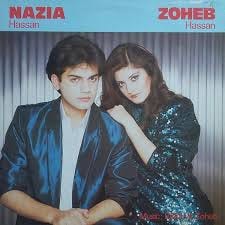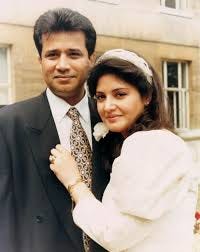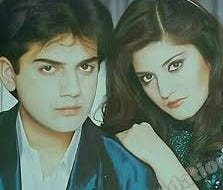Aap Jaisa Koi!
the abiding legacy of Nazia Hassan
There are songs, and books, and films, which stop us in our tracks. And we realize life as we know it won't be the same again. There's something infinite - sometimes in the most infinitesimal note, line or scene - which our bodies, beings and memory know will change our consciousness in ways we can't predict.
For me, Anand was that film, as was The Shawshank Redemption. Past Lives in recent times. The Winter of our Discontent and Pride and Prejudice, the books. And in music, Bridge over Troubled Water was written for my heart. But why only talk about masterpieces!!!!
Pulp is also memorable - and the two songs which blew the socks off me when they released, were Nazia Hassan's magical Aap jaisa koi in 1980, released when she was just 15, and the incredible Roja, tuned by the genius A R Rahman, when he was just 25.
There was an incredible uniqueness to Aap jaise koi. It was a sound Hindi music fans had never heard before, with a singer whose voice was a far cry from the dulcet tones we were used to so far. And then the filming on the gorgeous Zeenat Aman. I was in my 20s, and smitten irretrievably! And then the young beautiful singer herself - Nazia Hassan.
The beauty of good art is its ability to survive ages and trends, and how it remains fresh even as we change - as it addresses something core inside us.
Maybe it was the song's joie de vivre, maybe it was its poignant history, or maybe it just the memories of early youth with all its highs and messiness and longing and fantasy fulfilments.
And like so many wondrous things, the genesis of how Nazia was discovered is itself a story.
When the Real Khan Called
When Feroz Khan — the actor-director some still swear was the real Bollywood Khan — decided to make Qurbani, he had a vision. Part of that vision was to bring in a fresh, international sound. And for that, he had just one man in mind: Biddu.
Biddu Appaiah, born and raised in Bangalore, had left India at 23 and made his way to London, where he struck gold in the music world. With global hits like Kung Fu Fighting and Dance Little Lady Dance, Biddu had become the cool, disco-dipped sound of the ’70s.
Now, Feroz — also a Bangalore boy — reached out to Biddu. “Compose one song for Qurbani,” he urged. But Biddu wasn’t interested. India, he said, didn’t really excite him musically anymore. Feroz, ever the charmer, knew which string to pull. “Do it,” he said, “and your mother in Bangalore will be proud.”
Biddu agreed — but only with two conditions. One: the song would be recorded in London. Two: no Indian playback singer would be involved.
That left Feroz scrambling — he needed a Hindi singer based in London, and fast. That’s when Zeenat Aman, with her uncanny instinct, suggested he check out a young girl named Nazia Hassan.
Nazia was a teenager from Karachi. Her well-to-do parents had moved to London for the children’s education — Nazia and her brother Zohaib. She had no real professional singing background, except for a few songs on Sohail Rana’s children’s show in Pakistan when she was 8 or 9. But Zeenat had heard her at a family gathering, singing casually, and loved the voice, unaware that she was about to be plucked from obscurity.
Feroz mentioned her to Biddu, who slung his guitar over his shoulder and headed to Century Court Apartments on Grove End Road, where the Hassans lived. Nazia, just 15 and still in pigtails, sang Dance Little Lady Dance for him in their living room.
Biddu thought her voice had something. Not magic, maybe, but enough.
He went away and composed a new tune in just an hour — reworking something he’d once created for Tina Charles. And then, a few days later, they recorded the song at Red Bus Studios near Paddington. Nazia came straight from her O-level History exam to record.
The lyrics were written by Indivar. Biddu, whose grasp of Hindi and Urdu was shaky at best, struggled to pronounce even the mukhra. But the music — oh, the music — was simply electrifying. Created mostly on synthesizers, it featured the Syndrum, an electronic drum that made a futuristic whistle-like touuuu sound. No one had heard anything like it in India.
When Nazia’s grandmother heard the final song, she was so scandalised she stopped speaking to her for months. But the rest of the world couldn’t stop listening.
Picturised on the iconic Zeenat Aman, Aap Jaisa Koi lit up the screen — and Qurbani soared at the box office. Nazia, at just 15, won the Filmfare Award for Best Female Playback Singer in 1981 — becoming not only the youngest ever winner, but also the first Pakistani to receive the honour.
And it all started with one call from the real Khan.
Nazia Hassan: The Voice That Changed Everything
Nazia Hassan didn’t just sing — she redefined the sound of South Asia.
She took out one album after another, each one a greater success than the previous one. From Disco Deewane to Boom Boom, Young Tarang to Hotline, she gave us pop with style, soul, and shimmer. She and her brother Zoheb lit up TV screens, hosted Music ’89 — Pakistan’s first televised pop concert — and brought modern music to a generation that had never heard anything like it.
At the height of her fame, she drew crowds - 100,000 people turned up at the airport in Caclutta. Yet behind the spotlight, her life held deep pain. Her marriage was turbulent. In one of her last interviews, she revealed betrayal, emotional abuse, and abandonment — a tragedy that mirrored her illness.
Nazia passed away in London in 2000, just 35 years old, due to lung cancer. But her legacy never faded.
She was posthumously honoured with the Pride of Performance, a UNICEF Cultural Ambassadorship, and a doctorate. Her songs were used in films like Miss Lovely, and tributes poured in — from Coke Studio to Times Square. In 2018, Google honoured her with a doodle seen around the world.
Nazia was more than a pop icon. She was grace, strength, and revolution wrapped in melody.
South Asia’s Queen of Pop still sings — in memory, in legacy, and in every beat that dares to sound different.
Note - assembled and rewritten with inputs from an essay on FB, Wikipedia, and several articles on Nazia.
Ten of her favourite songs, as chosen by Rolling Stone -
https://rollingstoneindia.com/rs-essentials-revisiting-nazia-hassans-10-best-hits/amp/
‘A Music Fairy’ - a film on her life and times -
A tribute documentary -
An interview by Tabassum -
I write, so you can enjoy and expand your world. Would you like to support me? Well, here’s what you can do -
share this post -
subscribe if you still haven’t -
tell me of your thoughts -





